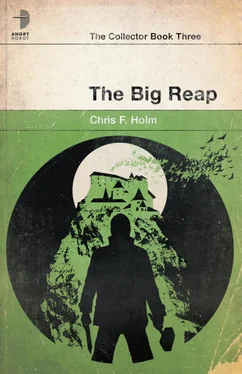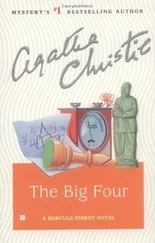Chris Holm - The Big Reap
Здесь есть возможность читать онлайн «Chris Holm - The Big Reap» весь текст электронной книги совершенно бесплатно (целиком полную версию без сокращений). В некоторых случаях можно слушать аудио, скачать через торрент в формате fb2 и присутствует краткое содержание. Город: Nottingham, Год выпуска: 2013, ISBN: 2013, Издательство: Angry Robot, Жанр: sf_fantasy_city, на английском языке. Описание произведения, (предисловие) а так же отзывы посетителей доступны на портале библиотеки ЛибКат.
- Название:The Big Reap
- Автор:
- Издательство:Angry Robot
- Жанр:
- Год:2013
- Город:Nottingham
- ISBN:9780857663429
- Рейтинг книги:5 / 5. Голосов: 1
-
Избранное:Добавить в избранное
- Отзывы:
-
Ваша оценка:
- 100
- 1
- 2
- 3
- 4
- 5
The Big Reap: краткое содержание, описание и аннотация
Предлагаем к чтению аннотацию, описание, краткое содержание или предисловие (зависит от того, что написал сам автор книги «The Big Reap»). Если вы не нашли необходимую информацию о книге — напишите в комментариях, мы постараемся отыскать её.
Sam Thornton has had many run-ins with his celestial masters, but he’s always been sure of his own actions. However, when he’s tasked with dispatching the mythical Brethren — a group of former Collectors who have cast off their ties to Hell — is he still working on the side of right?
File Under: Urban Fantasy [ Soul Solution | Secret Origins | Flaming Torches | Double Dealing ]
The Big Reap — читать онлайн бесплатно полную книгу (весь текст) целиком
Ниже представлен текст книги, разбитый по страницам. Система сохранения места последней прочитанной страницы, позволяет с удобством читать онлайн бесплатно книгу «The Big Reap», без необходимости каждый раз заново искать на чём Вы остановились. Поставьте закладку, и сможете в любой момент перейти на страницу, на которой закончили чтение.
Интервал:
Закладка:
She flinched as if stung, but she did not take her hand away. “What exactly do you think you’re doing?”
“Look. You’ve done your civic duty. Warned me how big and scary you are. How you plan to chew me up and spit me out if given half a chance. But not today, right? Because today, for me, was a giant fucking shit sandwich. Today, I’ve had about all that I can take. So if you want to use me and abuse me, you’ll have to wait your turn, because today I’m already used up. Which is why it seems to me we may as well enjoy our time in the sun. Unless, of course, I’m wrong, and you plan on getting started ruining me today.”
She looked at me a long while as if I were insane. But she never removed her hand. “No,” she said finally, resting her head upon my shoulder, “not today.”
And so we two damned souls sat for hours beneath the blazing sun in silence, and watched its rays glint off the water, bright and pretty as God’s grace.
21.
It was dusk when I arrived at the temple.
Temple was too strong a word, really, for the tangled heap of stone and jungle life I saw before me or, given said heap’s strange elemental majesty, too weak. In reality, the ravaged remains of the building didn’t look like a human structure in the slightest. The weathered sandstone spires seemed to rise out of the jungle as if not built but grown. The bas relief ornamentation — some Hindu, some Buddhist, and some animist — had been all but obliterated by the centuries, once telling tales of gods and men, but now nothing more than mossy crenellations on a wall. And in the thousand years since the site had been built — the nearly seven hundred since this site in particular had been abandoned — the jungle had done its level best to swallow the structure whole. Strangler figs pressed woody limbs through every hint of a crack. Massive thitpok trees draped surfaces with their fluid root structures which seemed to slither down across the rock face like the tentacles of a giant beast. Garlands of ropy vine strung themselves across every peak and column — always pulling, tugging, taking until the stone itself was forced to tender its crumbling surrender.
Believe me, I knew how it felt.
I’d been hiking for seven days, following Lilith’s vague directions — scrawled on a napkin from an ex-pat Irish bar in Phnom Penh — through the dense, forbidding wilds of Cambodia. The legends claim that Lilith has dominion over the warm Southern wind, and as the hot salt breath of the Gulf of Thailand blew ever northward with me, I couldn’t help but feel like she was with me — guiding, goading, or maybe just gloating it wasn’t her who had to carry the goddamn backpack.
Honestly, the whole country was so hot and sticky, I’d soak clean through my shirt by the time I shrugged the damn thing on. The fifteen miles or so a day I’d manage on foot — twenty, if a fisherman took pity on me and ferried me up the Mekong in one of the ubiquitous low-slung fishing vessels that sprinkle the river like so much flotsam — would leave me looking as though I’d taken a dip in the briniest of ocean waters, and smelling like the locker room to boot. And the one day I managed to hitch a ride — thirty-five miles in the back of a rusted pickup with a pair of orange-robed monks, whose sandals were made from tire-rubber and whose rice bowls (for all the Buddhist monks I encountered on my journey carried rice bowls, which locals delighted in filling with food from their own tables, and which the monks were quite willing to share with a poor, starving stranger) were, sadly, empty — the plumes of dirt kicked up off the unpaved road left my eyes and hair gritty, and my benefactor’s insistence upon driving over every fucking pothole left my tailbone so bruised I could scarcely sit the whole next day.
I was wearing the flesh of a middle-aged, middle-management Seattleite named McCluskey, who’d scheduled a layover in Phnom Penh on his way to inspect his company’s new call-center in Bangalore with the intention of exploring Cambodia’s ruins. I caught up with him when I overheard he and his wife Skyping in a Greenwood Avenue coffee house, not too long after the nightmare showdown in Bellevue. Thanks to me, he missed his bus to Angkor Wat, but I didn’t figure he’d mind. He’d shed a good five pounds of paunch on this little trek of mine, and anyways, I was showing him a real set of ruins — as in, the kind no one had laid eyes on since Columbus sailed the ocean blue.
No one but the last remaining Brethren, that is; the one that Lilith called Thomed.
After Bellevue, I confess I didn’t relish the notion of going toe-to-toe with another one of Lilith’s oogly booglies, particularly given this one went bamboo so long ago, having disappeared into the jungle not long after the beastly Ricou split from the group. God only knew what I was walking into. And when, as best as I could tell, I reached the end of Lilith’s map midday today and there’d been no temple to be found, just a modest fishing village comprising a few ramshackle stilted huts clustered around a muddy tributary too small to have a proper name, I’d half-hoped I wouldn’t have to, that perhaps Thomed simply wasn’t here. But when, with the help of McCluskey’s travel dictionary, I inquired in broken Khmer (which sounded close enough to Sanskrit to my ears to make me worry I might wind up inadvertently summoning a Rakshasa demon) as to whether there were any ruins nearby, their dogged insistence that they could not understand me, coupled with their refusal to meet my eye or stand in my presence for ten seconds before gruffly shouldering past, indicated that I was in the right place after all. And given all I’d learned about the Brethren these past few months, locating Thomed’s little hidey-hole from that point was a breeze. I just forced myself to walk in the direction my instincts screamed I shouldn’t, and within hours, I was there.
The question was, was Thomed?
I stepped gingerly through the remains, the ground an uneven hodgepodge of roots, fallen trees, and long-eroded manmade blocks. My eyes peeled and wary, my ears straining to pick out any sign of life, or failing that, of prior occupation. But aside of the teeming wildlife of the jungle — a living vine that proved to be a tree-bound python, the rustle in the bushes of a chocolate-brown wild boar, a monitor lizard basking on the crumbling stone face of a long-toppled god — I caught no sign of him. And so, against my better instincts, I squeezed past the cascade of thick, fibrous roots that hung like organic draperies in front of the ancient temple’s sole remaining entrance as if the very land itself wished to bar my entry, and stepped into the stifling dark.
Once my eyes adjusted, I realized the darkness of the temple’s interior was far from absolute. Shafts of golden light pierced the roof at regular intervals, the cracks through which it passed framed by encroaching plant life. And inside, too, the plants had taken hold, draping nearly every surface with roots and vines and, nearest the stagnant, black-watered puddles that graced the stone floor here and there beneath the roof-gaps overhead, fresh shoots sprouted up from the crumbling rock, leaves stretched skyward toward their Maker’s light.
The room was pillared, but unfurnished, and otherwise unadorned. Many of the pillars had toppled long ago, and in some places the ceiling had followed suit. I crept slowly deeper into the temple’s murk, mindful at every turn of any sense of motion that might signal Thomed’s attack.
At the head of the narrow, ruined room, I discovered a lone statue, moss-dusted and vine-bound. Not of a god, it seemed, but of a worshipper, cross-legged and eyes closed, its stone hands clasped in prayer or meditation. I had the strange sensation of embarrassment at interrupting its long penitence, for clearly it had sat in that same place so long that the temple had crumbled around it. The statue sat on a patch of jungle earth just large enough to accommodate it, from which sprouted countless vine-like growths that stretched upward toward the scant light leaking through the ceiling cracks above, winding like braided rope around the stone figure as they climbed. The effect was such that it appeared this praying figure had sprouted from the ground itself. I couldn’t tell if the growth had pushed up through the temple’s stone floor, or if the temple’s architects simply left this square of jungle bare. Though I had no idea why they might’ve elected to, the latter seemed the likelier option, since everywhere else plant life pushed through, it left cracks and stone debris in its wake, whereas here the borders were crisp and clear, a perfect square unmarred by broken rock.
Читать дальшеИнтервал:
Закладка:
Похожие книги на «The Big Reap»
Представляем Вашему вниманию похожие книги на «The Big Reap» списком для выбора. Мы отобрали схожую по названию и смыслу литературу в надежде предоставить читателям больше вариантов отыскать новые, интересные, ещё непрочитанные произведения.
Обсуждение, отзывы о книге «The Big Reap» и просто собственные мнения читателей. Оставьте ваши комментарии, напишите, что Вы думаете о произведении, его смысле или главных героях. Укажите что конкретно понравилось, а что нет, и почему Вы так считаете.











